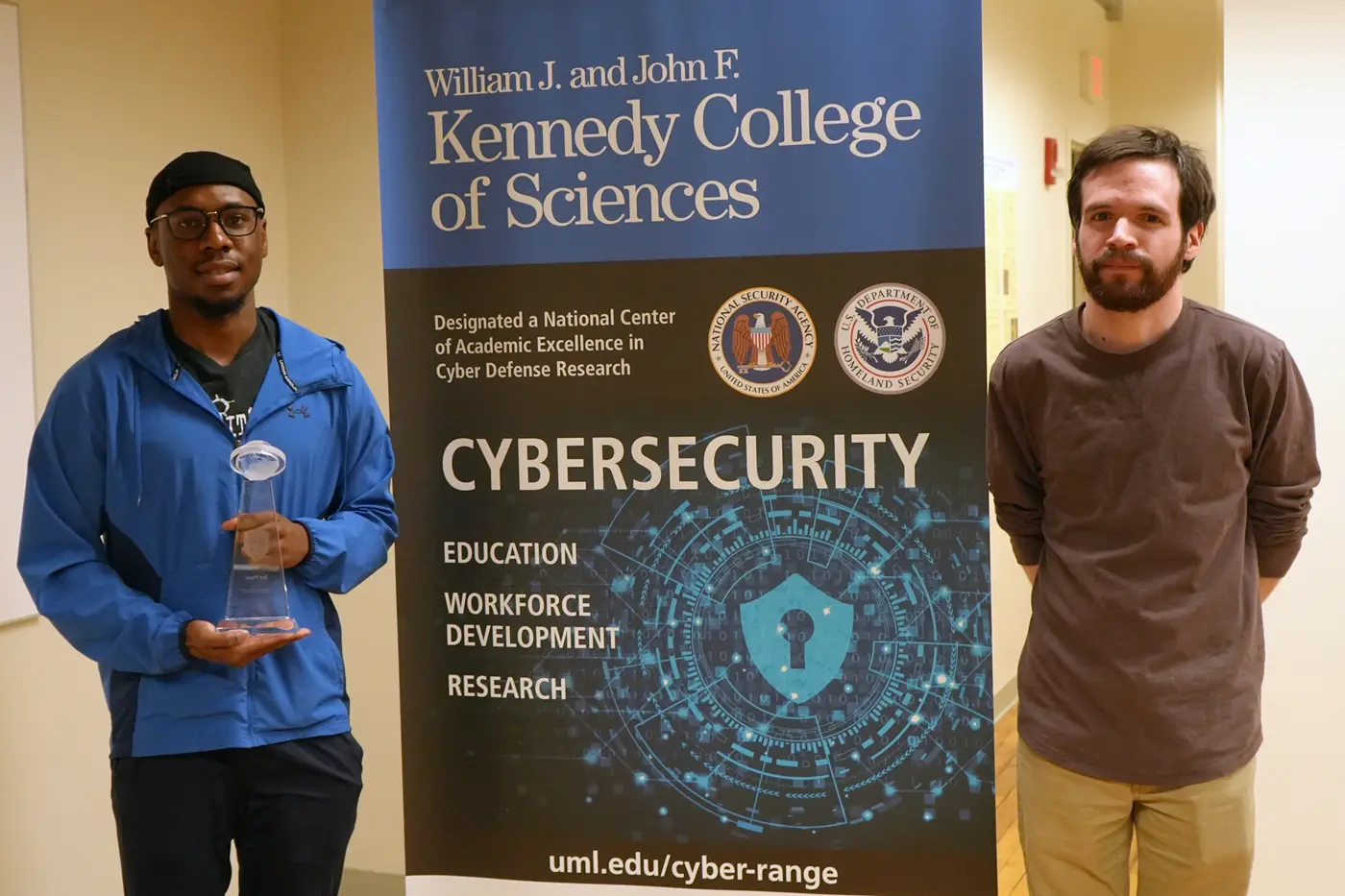 Image by Brooke Coupal
Image by Brooke Coupal
UML team co-captains Chisom Ukaegbu and Matthew Harper pose with the NECCDC third-place trophy.
The world’s critical infrastructure is under attack.
In 2023, Forescout Research – Vedere Labs recorded more than 420 million cyberattacks on critical infrastructure ranging from power grids to transportation networks. And the cost of these attacks is skyrocketing: According to the U.S. Office of the Director of National Intelligence, ransomware attack claims worldwide jumped 74% last year.
Computer science students got firsthand experience defending critical infrastructure during the 2024 Northeast Collegiate Cyber Defense Competition (NECCDC), held at Pace University in late March. For the first time, the UMass Lowell team placed in the competition, coming in third out of 10 institutions from New England and New York.
“The team stayed strong throughout the competition and had an impressive run,” says Sashank Narain, an assistant professor in the Miner School of Computer & Information Sciences who started coaching the UML team when it joined the competition in 2020. He also served as the NECCDC director in 2023 when UMass Lowell hosted the contest.
“I am pleased but not surprised to see our students do well in a field that touches all of us,” adds Noureddine Melikechi, dean of the Kennedy College of Sciences. “I am confident that our cybersecurity program will continue to grow and thrive. This success shows that our investment in this area was a wise one.”
 Image by Courtesy
Image by Courtesy
The UML team at the 2024 NECCDC.
The competing students were tasked with protecting a fictitious hydroelectric power plant from cybercriminals while working on assignments that included giving new users access to the infrastructure and securing sensitive information.
“This is as real as it gets outside of an actual job,” says Andrew Bernal, a senior from Lawrence, Massachusetts, who also competed in the 2023 NECCDC.
The UML team says they felt prepared going into the competition after spending months practicing in the Cyber Range, which is the university’s center for cybersecurity education, research and workforce development.
“The Cyber Range offers a lot of resources, so I learned a lot,” says first-year student Viktor Akhonen from Natick, Massachusetts.
“It’s nice having this space to work in person rather than practicing online,” adds senior Amaan Jamil from Chelmsford, Massachusetts. “It allowed for a lot of good communication during the competition.”
 Image by Brooke Coupal
Image by Brooke Coupal
Senior Matthew Hudzikiewicz, center, gets input from his team members at the Cyber Range.
First-year student Ryan Greaney regularly visits the Cyber Range, where he helped the UML team prepare for the NECCDC by serving as an “ethical hacker” during practices.
“To have a really good defense, you have to have a strong offense to push them and make them better,” says the Paxton, Massachusetts, resident.
New team members relied on the experience of returning competitors, including Chris Morales ’21, a Ph.D. student from Brockton, Massachusetts, who pivoted this year to co-coach.
“I had insight into knowing how the competition ran, so I could emulate it for the team during practices,” he says.
For Matthew Harper ’23, a Ph.D. student from Weymouth, Massachusetts, helping the younger students provided him with valuable skills, as he aspires to be a cybersecurity teacher.
“The competition is something that you don’t need prerequisites for, so you can make a great group of friends with people from every grade level,” says Harper, a co-captain of the UML team.
 Image by Brooke Coupal
Image by Brooke Coupal
First-year students Tyler Rafferty and Viktor Akhonen use the computers in the Cyber Range.
“I got the internship specifically because I put this competition on my résumé,” says Conners, who interviewed with a Doble employee who had previously competed in the NECCDC. “That was my in for conversation during the interview, so that helped a lot.”
Chisom Ukaegbu, a junior from Washington, D.C., and a UML team co-captain, says he would recommend the competition to all students interested in cybersecurity.
“I initially joined the Cybersecurity Club and ended up in this competition. I worked on things that I never touched before and ended up really liking it,” he says. “The competition is a great experience.”


